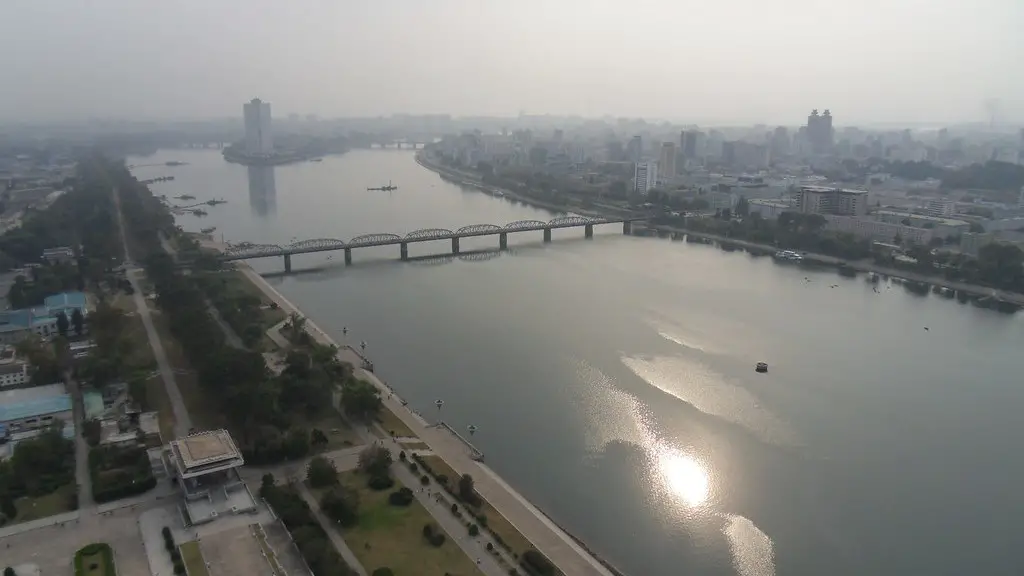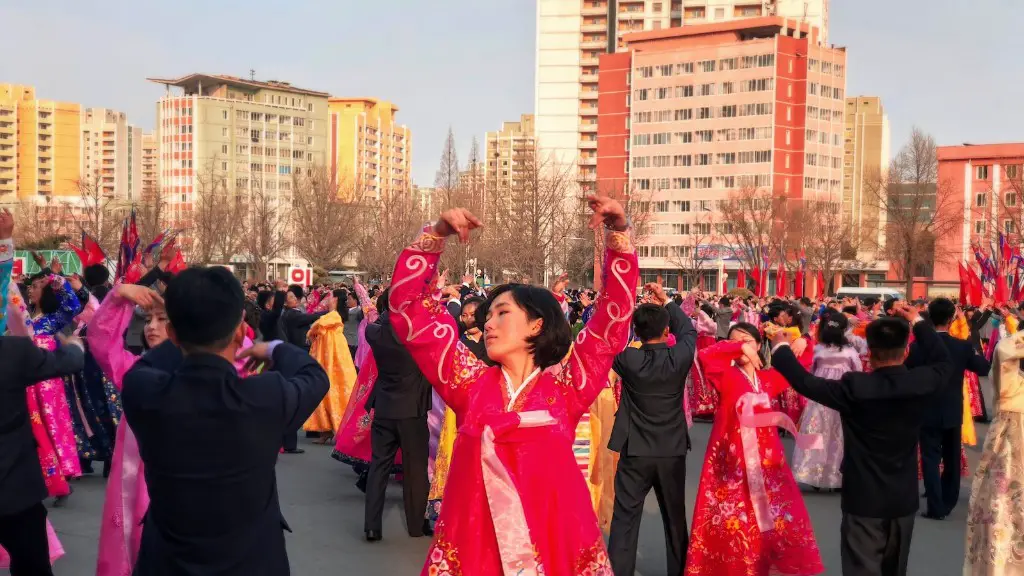The Korean Peninsula has been in a state of war for over 70 years. In 1950, North Korea invaded South Korea in an attempt to reunify the peninsula under communist rule. The United States intervened on behalf of South Korea, and the resulting conflict escalated into a full-scale war that lasted three years. An armistice was signed in 1953, but no formal peace treaty was ever signed, so technically, the Korean War is still ongoing. Despite the armistice, tensions between North and South Korea have remained high, and there have been periodic outbreaks of violence. In 2018, North Korea’s leader, Kim Jong Un, announced his intention to denuclearize the peninsula, and there have been some progress made in negotiations between North Korea and the United States. However, it is still too early to say whether the Korean War is truly over.
Yes, North Korea is still technically at war with South Korea and the United States. The Korean War ended in 1953 with an armistice and not a Peace Treaty, so technically the war never ended.
Is North Korea currently at war?
Kim Jong-un is the current leader of North Korea, and tensions between North and South Korea continue to this day. The Korean War was a devastating conflict that lasted from 1950 to 1953, and both countries were left in ruins. However, the division between North and South Korea remained, and the two countries have continued to have a military standoff, with periodic clashes. The conflict has survived the end of the Cold War and continues to this day.
The two Koreas are still technically at war after their 1950-53 conflict ended with an armistice rather than a peace agreement.
The armistice agreement that ended the Korean War was signed on July 27, 1953, by representatives from North Korea, China, and the United Nations Command. South Korea was not a signatory to the armistice agreement.
The armistice agreement provided for a ceasefire, the withdrawal of forces from the front line, and the establishment of the Korean Demilitarized Zone (DMZ).
The DMZ is a 160-mile long, 2.5-mile wide strip of land that runs across the Korean Peninsula. It is the most heavily fortified border in the world, and has served as a symbol of the division of the two Koreas since the end of the Korean War.
While the armistice agreement ended the fighting in the Korean War, it did not officially end the war itself.
The Korean War is often referred to as the “Forgotten War” because it did not receive the same level of attention as other conflicts such as World War II or the Vietnam War.
However, the Korean War is significant because it was the first major conflict
Is the Korean War ending
There is no one answer to this question – it depends on individual circumstances. However, some factors to consider include the purpose of the loan, the terms of the loan, the borrower’s credit history and financial situation, and the lender’s requirements.
The Korean War began on June 25, 1950, when North Korea invaded South Korea in an attempt to reunify the country under Communist rule. The United States intervened to defend the South, and a cease fire was signed in 1953. However, no official peace treaty has been signed, and there have been frequent clashes between the two Koreas up to recent times.
Are North Koreans allowed to leave?
North Korean citizens usually cannot travel freely around their own country, let alone travel abroad. Emigration and immigration are strictly controlled by the government. This means that people are not able to move freely in and out of North Korea, and are not able to choose where they live or work. This can have a big impact on people’s lives, and can make it very difficult to escape poverty or persecution.
The United States has no diplomatic relations with North Korea, and regards South Korea as the sole legitimate government of Korea. Relations between the two countries have been historically tense and hostile.
What is the longest war in history?
The Reconquista was a series of campaigns launched by the Christian states of the Iberian Peninsula to drive the Muslim rulingclasses out of the region and reestablish Christian control. The Muslim presence in the Iberian Peninsula dates back to the early 8th century, when the Umayyad Caliphate conquered the Visigothic Kingdom of Hispania in a series of bloody campaigns. The Muslim rulers imposed their own religion and culture on the conquered Christian inhabitants, many of whom were forcibly converted to Islam.
The Reconquista began in earnest in the early 11th century, when the Christian states of the north began to slowly but steadily expand their territories at the expense of the Muslim states in the south. Over the centuries, the Muslim rulers were slowly pushed back until, by the early 15th century, they controlled only the small kingdom of Granada in the extreme south. In 1492, the last Muslim ruler, Muhammad XII, was defeated and expelled from Granada, marking the end of Muslim rule in the Iberian Peninsula.
The Korean War is often referred to as the “forgotten war” in the United States because it received relatively little attention during and after the conflict. However, the war had a profound impact on geopolitics and set a precedent for American presidents to wage wars. The Korean War is still shaping geopolitical affairs today, and it is technically still ongoing since a peace treaty was never signed.
Did America win the Korean War
The Korean War was a conflict between North Korea and South Korea, which lasted from 1950 to 1953. The war began on June 25, 1950, when North Korea invaded South Korea, and ended on July 27, 1953, with an armistice agreement between the two countries.
While North Korea is one of China’s closest allies, North Korea itself ranks relatively low as a source of imports to China. North Korea is heavily dependent on trade and aid from China, although international sanctions against North Korea have decreased overall official volume of trade. China is North Korea’s largest trade partner, and North Korea exports mostly minerals, metals, and agricultural products to China. In return, North Korea imports Chinese goods, fuel, and food.
Did the US bomb China during the Korean War?
The report cites extensive on-site evidence, photographs, lab tests and witness statements, including those from captured US airmen, to conclude that the people of China and the DPRK were targeted by US biological weapons during the Korean War.
The Panmunjom Declaration for Peace, Prosperity and Unification of the Korean Peninsula was a major diplomatic breakthrough for North Korea and South Korea. The two countries had been at odds for many years, but the signing of the Declaration signaled a new era of cooperation and friendship. The Declaration has led to a significant warming of the relationship between the two countries, and has helped to improve the lives of many people on the Korean Peninsula.
Do North Koreans have Internet
As of 2022, only a small number of North Korean elites have access to the global internet, while ordinary citizens with mobile devices only have access to Kwangmyong, that is operated by the country. In terms of global internet access, this privilege is only granted to a small number of North Korean elites.
The alliance between the United States and South Korea is built on a shared commitment to peace and security in the Indo-Pacific region. For nearly seven decades, this alliance has been an anchor of peace and security on the Korean Peninsula and across the broader Indo-Pacific. Austin’s visit to Korea is a reaffirmation of the United States’ commitment to our close partnership with Korea and to the security and prosperity of the Indo-Pacific region.
Can people visit North Korea?
If you are considering traveling to North Korea, be aware that it is not possible to enter the country from South Korea or to enter South Korea from North Korea. The only way for foreigners to enter North Korea is by air or by train. Even if you meet all entry requirements, you may be arbitrarily arrested and/or detained at your point of entry.
The US Department of State has issued a travel advisory for North Korea, recommending that US citizens do not travel to the country due to the continuing serious risk of arrest and long-term detention. The advisory also advises Americans to exercise increased caution to North Korea due to the critical threat of wrongful detention.
Warp Up
Yes, North Korea is still at war.
The answer may appear to be yes, considering that North Korea and South Korea have not reached a peace treaty since the Korean War. However, technically, the Korean War is over. In 1991, the Soviet Union collapsed, leaving North Korea without one of its key allies. This, in addition to new international pressure, led to North Korea agreeing to a ceasefire in 1993. So while North Korea and South Korea are still in a technical state of war, there has been no fighting between the two countries for over 25 years.





